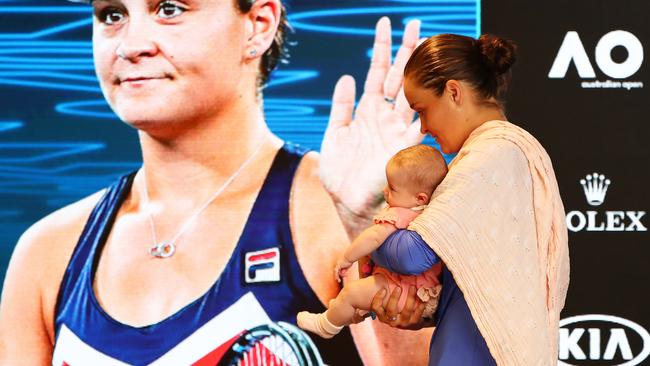Ash Barty inspires, even in defeat
Ash Barty lost her touch in the semi-final against Sofia Kenin and lost her chance to win her home grand slam title.

In the front row of the VIP section was Cathy Freeman. She wore a white jacket and rock star sunglasses. The case for her mobile phone was the colour of the medal she won at the Sydney Olympics. The aura and free-spiritedness of the woman.
“Cathy,” she said to Margaret Court, shaking her hand, taking her seat for an Australian Open semi-final that would become a strangely quiet and dispiriting affair. The feel player would not be feeling it at all.
Rebel Wilson was in a dress as green as the Wimbledon grass. She received the best seat in Rod Laver Arena, the one Laver would have been in if he was here, a couple down the row from Freeman.
They laughed and chatted and touched each others’ arms. Everything was looking and sounding pretty fabulous right then.
Ash Barty emerged from the tunnel and blinked at the burning sun as the mercury climbed towards 39C. The feel-good player was about to run cold.
If there was to be a queen of Australian sport it would be the self-effacing, publicity-shunning, tender-hearted, unfailingly humble Freeman. And here she was in a rare public appearance, urging on Barty like she gave moral support to Greg Inglis in the 2014 NRL grand final.
Earlier in the day, at an Australian Open function grandly called the AO Inspirational Lunch, which must have involved some decent tucker, Freeman said of her indigenous sister: “I can confidently say on behalf of Aussies, and particularly the indigenous community, we’re very proud of her. I think the impact she can have on everybody, but particularly young girls, is quite profound. Her achievements and her story will get into the psyche and into the blood of so many young girls around not just Australia, but the world. It’s very cool.
“She’s an amazing role model. She seems to have a really good head on her shoulders, really community-minded, not too overawed by the success she’s having. It’s wonderful.”
Asked what advice she would give Barty, Freeman said: “Its really important to just trust in yourself and trust in your training and your preparation and just know we’re there for you.”
Sofia Kenin looked like trouble as she walked in. Her racquet displayed the colours of the Star Spangled Banner. Not everyone in the crowd was familiar with the American, in particular the bloke who shouted “Come on, Sonia!”
She continued her highly unusual trait of staring at the ground during the first one-twelfth of her service motion, looking at the baseline as though it might move unless she kept an eye on it.
She marched around like an American prom queen. Like she had 15 minutes of housework to get done in the next 10.
The first set was a bludger of a thing. When Barty lost it, she shook her head at coach Craig Tyzzer in a dispirited manner, filling no one with confidence.
There was a weird quietness inside RLA. Like it was too bloody hot for anyone to clap, like the scratchy nature of the match provided no one with comfort, like Dominic Thiem and Rafael Nadal had soaked up all the atmosphere.
Freeman, knowing a thing or two about the pressure of performing on a home deck, sat on the edge of her seat, watching Barty closely, clapping politely, her right foot tapping anxiously on the ground.
Kenin thanked Barty when the Australian called “not up” to a ball she failed to get to. It wasn’t quite Adam Gilchrist walking at the World Cup, but it was a sporting gesture nonetheless.
Barty could not escape her funk. She kept missing sliced backhands. When she held serve for 4-2 in the second set, she roared “Come on!” The decibels rose in the bleachers. She held serve to love from The Cathy Freeman End. But, slow out of the blocks, she could not do a Freeman, she could not swoop past Kenin on the final bend, she could not find her feel, she could not get herself on to the podium despite having two set points in each set.
Barty’s reaction to her 7-6 (8-6) 7-5 defeat? She held her latest toddler niece, Olivia, in her arms and with a trembling voice said that was what life was all about: “Perspective is a beautiful thing. Life is a beautiful thing.”
Her acceptance of defeat was understandable when you considered the background. A teenage Barty was right here at Melbourne Park when she wept and fell into the arms of her coach, Jason Stoltenberg and told him the truth about everything she was feeling: “I cannot do this anymore.”
Stoltenberg had seen the red flags in the junior Wimbledon champion. Listlessness. Sadness. The loneliness of being on the road; of being a 17-year-old living alone in a South Yarra apartment when everything she held dear was in Queensland. The dark cloud was emerging that would necessitate two years of antidepressant medication.
Every time she burst into a million tears and admitted to her true feelings, she realised she felt a million and one times better. She’s had tougher days than this.
Sitting near Stoltenberg among Barty’s entourage was Jim Joyce, Barty’s first coach, who once threw one of her junior trophies into a rubbish bin and said she had better silverware in her future. Perhaps he was already thinking of the Daphne Ackhurst Memorial Cup. That would be a keeper. He’s still right. You would still wholeheartedly expect and feel it’s destined for Barty in some future year, just not this year.




To join the conversation, please log in. Don't have an account? Register
Join the conversation, you are commenting as Logout